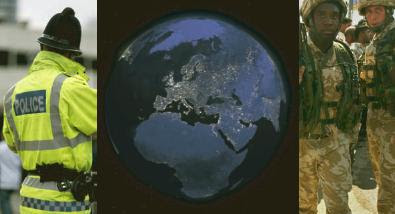Brown's Coalition For Justice
 Speaking to the United Nations in New York, Gordon Brown says he wants to "summon into existence the greatest coalition of conscience in pursuit of the greatest of causes" — that the world should "forge a coalition for justice" to combat what he called the "emergency" of global poverty.
Speaking to the United Nations in New York, Gordon Brown says he wants to "summon into existence the greatest coalition of conscience in pursuit of the greatest of causes" — that the world should "forge a coalition for justice" to combat what he called the "emergency" of global poverty.
The problem is, while he talks a good talk, his record just doesn't give any confidence that he will deliver on his promises of empowerment and free trade:
We need a compact - the rich accepting their responsibilities to invest, to support, to end protectionism and to deliver our promises; the developing countries accepting their responsibilities to reform, to open up to trade, and to be transparent and free of corruption. But our objectives cannot be achieved by governments alone, however well intentioned; or private sector alone, however generous; or NGOs or faith groups alone, however well meaning or determined - it can only be achieved in a genuine partnership together.After all, he has spent the last ten years taking power away from the people under his influence, so what makes anybody think he will begin giving it back to us all now? Consider what he says on protectionism:
So it is time to call into action the eighth of the Millennium Goals so we can meet the first seven. Let us remember Millennium Development Goal eight - to call into being, beyond governments alone, a global partnership for development, and together harness the energy, the ideas and the talents of the private sector, consumers, NGOs and faith groups, and citizens everywhere. The sum of all the individual actions working together to achieve real change. Some people call it the mobilisation of soft power...I call it people power. People power in support of the leadership of developing countries.
Perhaps for too long we have talked the language of development without defining its starting point in wealth creation - the dignity of individuals empowered to trade and be economically self sufficient.If he really means what he says, presumably we will see Britain adopting a new tough stance in Europe as we withdraw from the Common Agricultural Policy and Common Fisheries Policy? I, for one, won't be holding my breath...
No country has moved to development without opening up to trade.
So I accept an immediate obligation on world leaders to address protectionism and work to make what we promised - the development trade round - happen this year.
![President Bush welcomes British Prime Minister Gordon Brown to the presidential retreat at Camp David [Credit: TimesUnion.com]](https://blogger.googleusercontent.com/img/b/R29vZ2xl/AVvXsEgL3s-li-4iK4i-z7ARCT_K1etU6BUWTAGfaXYVs0EoolPJdrx9ekWErJnTeD-QLUkLGfE-EXVF7g2nLnko3lFCVbbbPSzL8U3v9BHOD-Gt2Ub3ke9bU_UhYn7-K5i9Z3B-o-7caOkU9_Ni/s400/Bush-Brown.jpg)
 (Shropshire: 289,000) could not also cope — if only the Government could see its way to trusting the people.
(Shropshire: 289,000) could not also cope — if only the Government could see its way to trusting the people.![Beijing 2008 Olympics - Steven Spielberg - Darfur, Sudan [Credit: ABC News]](http://a.abcnews.com/images/International/abc_speilberg_070725_ms.jpg)

 I had the misfortune to need to post an urgent letter today. So, having managed to avoid the post office for some weeks (in fact, since the last time they
I had the misfortune to need to post an urgent letter today. So, having managed to avoid the post office for some weeks (in fact, since the last time they  A political debate?! All I wanted to know was whether I could post my letter somewhere else where I might have a greater chance of (1) my letter not being lost, (2) my letter being delivered on time, (3) the whole service not being further blighted by industrial action reminiscent of the 70s...
A political debate?! All I wanted to know was whether I could post my letter somewhere else where I might have a greater chance of (1) my letter not being lost, (2) my letter being delivered on time, (3) the whole service not being further blighted by industrial action reminiscent of the 70s... Almost before any of us have had a chance to digest Tuesday's report from the
Almost before any of us have had a chance to digest Tuesday's report from the ![Car fuelled by plant oil in a field of rape [Credit: Nordic Folkecenter for Renewable Energy]](http://www.folkecenter.net/mediafiles/folkecenter/technologies/plant_cars/running-on-plantoil.jpg)
 Just last November, Home Office minister Liam Byrne declared of the Conservatives, "All that they offer in place of ID cards is the chaos of a damaging, distracting and disruptive reorganisation of three agencies on the front line into a single border force. That idea is outdated and is rooted in a concept of a frontier that is long past. It is simplistic and dangerous in the disruption that it poses."
Just last November, Home Office minister Liam Byrne declared of the Conservatives, "All that they offer in place of ID cards is the chaos of a damaging, distracting and disruptive reorganisation of three agencies on the front line into a single border force. That idea is outdated and is rooted in a concept of a frontier that is long past. It is simplistic and dangerous in the disruption that it poses."


 The news is reporting that the number of prescriptions for antidepressants and other mind-altering drugs given to children under 16 has more than quadrupled in the last decade. As shocking as this statistic is, checking
The news is reporting that the number of prescriptions for antidepressants and other mind-altering drugs given to children under 16 has more than quadrupled in the last decade. As shocking as this statistic is, checking  It appears all the recent flooding across the country may have helped the Government find a solution to the problem of affordable housing. Just consider some recent headlines and join the dots:
It appears all the recent flooding across the country may have helped the Government find a solution to the problem of affordable housing. Just consider some recent headlines and join the dots:

 I think the
I think the ![The Rush to Ethanol: Not All Biofuels are Created Equal [Network for New Energy Choices]](http://www.newenergychoices.org/img/head_rush.jpg)
![Mississippi Dead Zone [Credit: Scientific Visualization Studio at NASA/Goddard Space Flight Center]](http://svs.gsfc.nasa.gov/vis/a000000/a002900/a002979/dead_zone_summer_web.jpg)

![Hezbollah flags in front of Big Ben [Credit: moonbatmedia.com]](http://img156.imageshack.us/img156/362/dsc02111sd8.jpg)
 Zimbabwe's
Zimbabwe's  For the third day in a row, we have
For the third day in a row, we have ![holy cow [Credit: A Step Apart]](http://skyblu.files.wordpress.com/2007/04/holy-cow.jpg)

![Which is the greater insult to Islam? [Credit: USA Today]](http://images.usatoday.com/news/_photos/2006/02/10/cartoon.jpg) The politically correct would maintain that nobody should be permitted to offend Muslims. A Danish court has today judged in favour of common sense:
The politically correct would maintain that nobody should be permitted to offend Muslims. A Danish court has today judged in favour of common sense: Hey, if
Hey, if  So writes Daniel Henninger in today's
So writes Daniel Henninger in today's 
 Thanks to ten years of Government obsession with targets and legislation, the Chief Inspector of Probation says that many offenders are not monitored or supervised properly because there are too many demands on probation staff in England and Wales. Writing in
Thanks to ten years of Government obsession with targets and legislation, the Chief Inspector of Probation says that many offenders are not monitored or supervised properly because there are too many demands on probation staff in England and Wales. Writing in ![Charles Clarke holding 'Get out of jail free' card [Credit: Beau Bo D'Or]](http://www.ccfwebsite.com/~thedifference/images/jailfreerm.jpg)
 Writing in the overview to the Social Justice Policy Group's report,
Writing in the overview to the Social Justice Policy Group's report, 
 In addition to
In addition to  Why on earth did the Today programme give Alistair Campbell a full half-hour to promote his book and spin for Tony Blair this morning, when we have the head of Interpol criticising our immigration procedures and claiming "
Why on earth did the Today programme give Alistair Campbell a full half-hour to promote his book and spin for Tony Blair this morning, when we have the head of Interpol criticising our immigration procedures and claiming "
 Ever have trouble thinking of a present to give someone on their birthday? Or, for that matter, to suggest someone give you on your own birthday? Here's a few animal-themed ideas, from the South Africa register of MPs' interests:
Ever have trouble thinking of a present to give someone on their birthday? Or, for that matter, to suggest someone give you on your own birthday? Here's a few animal-themed ideas, from the South Africa register of MPs' interests: Can anyone tell me the size of the carbon footprint required to bring together and produce the many artists for today's latest musical reunion concert?
Can anyone tell me the size of the carbon footprint required to bring together and produce the many artists for today's latest musical reunion concert? So, former Liberal Democrat leader Charles Kennedy has apparently been "spoken to" by police for smoking on a train.
So, former Liberal Democrat leader Charles Kennedy has apparently been "spoken to" by police for smoking on a train.
 The International Olympic Committee's decision to host the 2014 Winter Olympics in Sochi, Russia in preference to the other final round candidate cities—Austria's Salzburg and South Korea's Pyeongchang—is an opportunity to expose the country's wanton legacy of human rights abuses, just as 2008 has enabled the spotlight to be thrown on
The International Olympic Committee's decision to host the 2014 Winter Olympics in Sochi, Russia in preference to the other final round candidate cities—Austria's Salzburg and South Korea's Pyeongchang—is an opportunity to expose the country's wanton legacy of human rights abuses, just as 2008 has enabled the spotlight to be thrown on 
